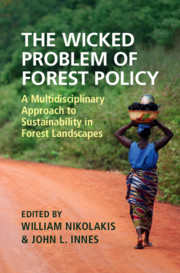 The Wicked Problem of Forest Policy
The Wicked Problem of Forest Policy Progress and Pitfalls
from Part II - Tools to Address Wicked Problems
Published online by Cambridge University Press: 24 July 2020
Community forestry has long been regarded as a way to achieve the sustainable management of forest and tree resources while maximizing benefits for those responsible for the custodianship of natural resources. Throughout much of the developing world, forests and the lands they occupy have been increasingly ceded to the management and control of Indigenous peoples and local communities. In the post-conflict environment of Liberia, community forestry has been identified as a means of maximizing the engagement of local communities in forest management initiatives. Liberia’s recent comprehensive National Forestry Policy is an important step forward in this process. The new legislative framework makes it clear that a major reorientation of the forestry sector is required if it is to successfully address the economic challenges facing the country. These challenges concern the need to substantially improve forest governance and to ensure that the forest sector contributes more effectively to the alleviation of poverty and livelihood improvement. While, on paper, the legal framework for community forestry is robust, implementation is falling short due to conflicts over land and resources that have pervaded the Liberian forestry sector for decades. Increased investment in oil palm expansion, artisanal agriculture and broader government-supported logging activities all threaten the implementation of community forestry. Concomitantly, a fundamental lack of capacity at the community level and at the level of the Forestry Department has curtailed early attempts to operationalize community forestry in the country. In this chapter we explore the evolution and development of community forestry in Liberia, and assess prospects for its future implementation. We provide a clear framework of recommendations to address potential constraints to its success.
To save this book to your Kindle, first ensure [email protected] is added to your Approved Personal Document E-mail List under your Personal Document Settings on the Manage Your Content and Devices page of your Amazon account. Then enter the ‘name’ part of your Kindle email address below. Find out more about saving to your Kindle.
Note you can select to save to either the @free.kindle.com or @kindle.com variations. ‘@free.kindle.com’ emails are free but can only be saved to your device when it is connected to wi-fi. ‘@kindle.com’ emails can be delivered even when you are not connected to wi-fi, but note that service fees apply.
Find out more about the Kindle Personal Document Service.
To save content items to your account, please confirm that you agree to abide by our usage policies. If this is the first time you use this feature, you will be asked to authorise Cambridge Core to connect with your account. Find out more about saving content to Dropbox.
To save content items to your account, please confirm that you agree to abide by our usage policies. If this is the first time you use this feature, you will be asked to authorise Cambridge Core to connect with your account. Find out more about saving content to Google Drive.